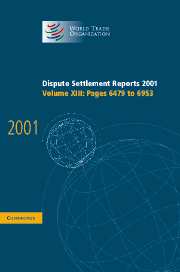Book contents
- Frontmatter
- Contents
- United States - Import Prohibition of Certain Shrimp and Shrimp Products - Recourse to Article 21.5 of the DSU by Malaysia (WT/DS58): Report of the Appellate Body
- United States - Import Prohibition of Certain Shrimp and Shrimp Products - Recourse to Article 21.5 of the DSU by Malaysia (WT/DS58): Report of the Panel
- Mexico - Anti-Dumping Investigation of High Fructose Corn Syrup (HFCS) from the United States - Recourse to Article 21.5 of the DSU by the United States (WT/DS132): Report of the Appellate Body
- Mexico - Anti-Dumping Investigation of High Fructose Corn Syrup (HFCS) from the United States - Recourse to Article 21.5 of the DSU by the United States (WT/DS132): Report of the Panel
- Canada - Measures Affecting the Importation of Milk and the Exportation of Dairy Products - Recourse to Article 21.5 of the DSU by New Zealand and the United States (WT/DS103, WT/DS113): Report of the Appellate Body
- Canada - Measures Affecting the Importation of Milk and the Exportation of Dairy Products - Recourse to Article 21.5 of the DSU by New Zealand and the United States (WT/DS103, WT/DS113): Report of the Panel
Mexico - Anti-Dumping Investigation of High Fructose Corn Syrup (HFCS) from the United States - Recourse to Article 21.5 of the DSU by the United States (WT/DS132): Report of the Panel
Published online by Cambridge University Press: 13 December 2017
- Frontmatter
- Contents
- United States - Import Prohibition of Certain Shrimp and Shrimp Products - Recourse to Article 21.5 of the DSU by Malaysia (WT/DS58): Report of the Appellate Body
- United States - Import Prohibition of Certain Shrimp and Shrimp Products - Recourse to Article 21.5 of the DSU by Malaysia (WT/DS58): Report of the Panel
- Mexico - Anti-Dumping Investigation of High Fructose Corn Syrup (HFCS) from the United States - Recourse to Article 21.5 of the DSU by the United States (WT/DS132): Report of the Appellate Body
- Mexico - Anti-Dumping Investigation of High Fructose Corn Syrup (HFCS) from the United States - Recourse to Article 21.5 of the DSU by the United States (WT/DS132): Report of the Panel
- Canada - Measures Affecting the Importation of Milk and the Exportation of Dairy Products - Recourse to Article 21.5 of the DSU by New Zealand and the United States (WT/DS103, WT/DS113): Report of the Appellate Body
- Canada - Measures Affecting the Importation of Milk and the Exportation of Dairy Products - Recourse to Article 21.5 of the DSU by New Zealand and the United States (WT/DS103, WT/DS113): Report of the Panel
Summary
INTRODUCTION AND FACTUAL BACKGROUND
On 24 February 2000, the Dispute Settlement Body (“the DSB”) adopted the report and recommendations of the Panel in Mexico - Anti-dumping Investigation of High Fructose Corn Syrup (HFCS) from the United States (WT/DS132/R). In that report, the Panel concluded that Mexico's imposition of the definitive anti-dumping duties on imports of high fructose corn syrup, grades 42 and 55, from the United States was inconsistent with the requirements of the Agreement on Implementation of Article VI of the General Agreement on Tariffs and Trade 1994 (AD Agreement). The panel and the DSB accordingly recommended that Mexico bring its measure into conformity with its obligations under the AD Agreement.
On 20 September 2000, the Government of Mexico published a final resolution in which it stated that it had revised the original final resolution imposing definitive anti-dumping duties on imports of high fructose corn syrup, grades 42 and 55, from the United States to comply with the Panel report's conclusions and recommendations. Mexico determined to repay provisional duties on entries and guarantees granted for the payment of provisional anti-dumping duties, with interest, for the period 26 June 1997 to 23 January 1998. Mexico also “ratified its conclusion that during the period under investigation, there was a threat of harm to the domestic sugar industry as a consequence of imports of high fructose corn syrup under price discriminatory conditions originating from the United States of America”. The revised final resolution confirmed “the final offsetting duties established during the antidumping investigation”.
On 12 October, the United States submitted a communication seeking recourse to Article 21.5 of the DSU (WT/DS132/6). In that communication, the United States indicated its view that the measures taken by Mexico to comply with the recommendations and rulings of the DSB were not consistent with the AD Agreement. In particular, in the view of the United States, Mexico's redetermination of a threat of material injury, including its consideration of the impact of dumped imports on the Mexican sugar industry, its consideration of the potential effect of the alleged restraint agreement in its determination of a likelihood of substantially increased importation, and its explanation of the findings and conclusions it reached on all material issues of fact and law, failed to comply with the recommendations and rulings of the DSB and was inconsistent with Articles 3.1, 3.2, 3.4, 3.5, 3.7, 12.2, and 12.2.2 of the AD Agreement.
- Type
- Chapter
- Information
- Dispute Settlement Reports 2001 , pp. 6717 - 6828Publisher: Cambridge University PressPrint publication year: 2004
- 4
- Cited by

